 01254 774943
01254 774943  01254 774943
01254 774943 With 2018 drawing ever closer, now is certainly not the time to bury your head in the sand and become complacent about compliance with the new EPC legislation!
But if you still find yourself panicking over your energy performance, then our experts are on hand to help! They’ve answered all of your most burning questions regarding everything and anything there is to know about EPCs!
Quite simply, an Energy Performance Certificate is an assessment that identifies how energy efficient your property is. As a legal requirement, it provides you with an indication of your property’s current energy performance.
One thing you definitely need to be aware of is that an EPC assessment is not a Structural Building Survey, a Building Condition Survey, or a Market Valuation. Therefore, an assessor will only consider the type of property, its construction, and relevant fittings, such as heating systems, insulation or double-glazing, etc. They will also not comment on any hazardous material, such as asbestos or high alumina cement concrete.
An EPC will contain:
– Information about a property’s energy usage and typical energy costs
– Recommendations about how to reduce energy usage and save money
After you’ve accepted a quotation from a qualified assessor, they will visit your property, carry out a measured survey and collect data/photographic evidence of all lighting, constructions, and heating/cooling plant. The assessor will use a standardised, government-approved software (iSBEM for commercial properties and RdSAP for domestic) to model the building and calculate its rating. This will then be presented in a standard layout, which is the Energy Performance Certificate.
The Energy Rating bands can be seen below. As you can see, an A grade is the most energy efficient rating, whereas if you pan to the bottom of the bands, a G grade is the least energy efficient rating. Keep in mind, however, that this is soon to change! As of 1st April 2018, new leases of residential or commercial properties will be UNLETTABLE if their EPC rating is an ‘F’ or ‘G’.

An EPC is valid for 10 years and it can be used multiple times during this period. This means that if you’re a seller or a landlord, you do not need a new EPC every time you rent or sell to a prospective tenant or buyer.
Our team are quick and efficient, so you could expect your certificate to be issued to you or your estate agent within 48 hours! It really is that quick and simple!
Energy Performance Certificates are needed whenever a property is built, sold or rented. So anybody who wishes to sell or lease a domestic or commercial property requires an EPC within 28 days of the property being placed on the market, or at the point of sale/signing of lease, if a property is not marketed.
If your property has a low energy rating, it means that it’s likely to lose market value. This is because it will be more expensive to live in the property, so it becomes less attractive to buyers and tenants. With this in mind, you may also see an impact during rent reviews, since tenants are likely to fight rent increases if their property has a poor EPC rating.
An EPC can be obtained by contacting an accredited Assessor, who will then need to know the location, size and complexity of your property. You should then be offered a quotation.
If you’d like peace of mind and high quality assurance, get in touch with a member of our team. One of our chartered Building Surveyors or qualified Energy Assessors will be able to arrange your hassle-free assessment.

Of course! If you’re not happy with your assessment, you are well within your rights to have your property reassessed. However, it’s important to bear in mind that the ratings from all assessors are likely to be more or less the same, within given tolerances. This is because all ratings are working out using a standard software called iSBEM. All EPC assessors should also be accredited and audited, in order to prevent inaccurate ratings.
As previously mentioned, there is a huge change in legislation regarding Energy Performance Certificates. This refers to the onset of the new minimum energy efficiency standards (MEES). As of April 2018, if any property receives an energy rating lower than an E (so either an F or G), it becomes unlettable.
So with time ticking away, don’t leave getting your EPC to the last minute!
First and foremost, a property cannot be put onto the market, for sale or lease, without an EPC rating. Additionally, if an EPC is not available for everyone to view in the property, then the solicitors dealing with the transaction will definitely request a copy. If unavailable, this will delay the process whilst your property is assessed.
Legally speaking, if an EPC is rated lower than an E, then the property cannot be sold or leased until remedial works are carried out to bring the building up to standard. Your property must then achieve an energy rating that is higher than an E to become legal again.
For domestic properties, the penalty for not producing a legal EPC is £200. For non-domestic properties, the penalty is a sum equivalent to 12.5% of the rateable value of the building, subject to a minimum of £500 and a maximum of £5000.
So if you’re looking for a solution to tackle unlettable properties, look no further! Our experts offer a MEES report (a Minimum Energy Efficiency Standards report). This is a cost effective solution to ensuring your property complies with the legal EPC requirements. For more information, click here.
In terms of pricing, you need to decide what category your property falls into:
Domestic:
EPC prices vary from around £45-£75 for a typical single dwelling (up to 4 bedrooms). For bulk order EPCs, prices may drop as low as £35 per dwelling, depending on how many are required and how closely together they are located.
Larger, more complex houses will cost more depending on size. This could cost from £85-£250+ for extremely large properties.
Non-Domestic:
Once again, prices can vary depending on the size and complexity of the building. Base prices start at around £145 for a small retail shop or small open plan industrial unit, and upwards of £1000 for much larger buildings.
As a landlord or seller, the benefits of a high EPC rating are bountiful! First and foremost, a rating of an E or higher will allow you to sell or rent your property (from April 2018). Then, you’ll discover that your more energy efficient building is less costly to run, so will become a lot more desirable to a prospective buyer or tenant! You could then potentially charge a higher rent or asking price.
It may come as quite a surprise, but there are actually quite a few types of property that are not eligible for an Energy Performance Certificate. These include:
– Places of worship, such as Churches or Mosques
– Temporary buildings that will be used for less than two years
– Stand-alone buildings with a total useful floor space of less than 50 square metres
– Industrial sites, workshops and non-residential agricultural buildings that don’t use a lot of energy
– Some buildings that are due to be demolished
– Holiday accommodation that’s rented out for less than 4 months a year, or is let under a licence to occupy
– Listed buildings – you should seek advice from your local authority conservation officer, if the work would alter the building’s character
– Residential buildings intended to be used less than 4 months a year

The EPC regulations state that ‘a reference to a building includes a reference to a part of a building which has been designed or altered to be used separately’. With this in mind, if a building is divided into units, but is sold or marketed as a single building, then only one EPC will be required.
However, if the building is divided into units that are sold or marketed separately, then separate EPCs will be needed for each unit. The critical factor would be whether each unit has a common heating system, or not.
We recommend that you keep your EPC somewhere safe. But if you’ve locked it away and accidently thrown away the key, head to: www.epcregister.com. Simply click the link to access the Domestic EPC Registers. Click on ‘Report Retrieval’ and follow the instructions on the screen.
Still got questions?
If we still haven’t managed to answer all of your questions, don’t panic! Contact a member of our team.
